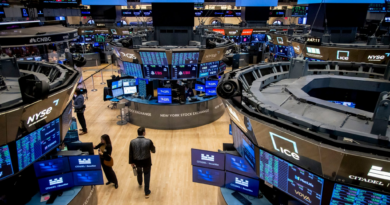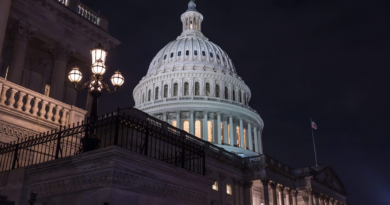JetBlue CEO defends $3.8 billion mega-merger in court, saying the Big 4 airlines control 80% of ticket revenue
JetBlue Airways Corp. wants to use its acquisition of deep-discount carrier Spirit Airlines Inc. to compete with the four major airlines, with plans to rebrand Spirit jets and reduce their seats per plane by 10% to 15%, Chief Executive Officer Robin Hayes testified at an antitrust trial.
JetBlue’s primary goal in spending $3.8 billion to buy Spirit was to go up against the likes of American Airlines Group Inc., Delta Air Lines Inc., United Airlines Holdings Inc. and Southwest Airlines Co., Hayes told a judge in Boston during a trial over the federal government’s bid to block the deal.
“It is a very tall order to compete with them,” Hayes said Monday, his second day on the witness stand. The top four airlines account for about 80% of US ticket revenue. “We’ve spent 20 years now carving out 5%” of the market as a value-focused carrier, Hayes said.
JetBlue has studied possible acquisitions of smaller airlines for years and determined it was the only way to compete with larger carriers. “You’d never, ever get to the size they are based on organic growth,” Hayes said of the big four companies. “Let’s recall that they didn’t get there through organic growth either — they got there through mergers and acquisitions.”
The US Justice Department’s lawsuit challenging the JetBlue-Spirit merger is part of an ongoing effort by antitrust regulators to limit consolidation within the airline industry, after decades of approving deals with little restriction. Government lawyers say the transaction violates antitrust law because it would eliminate JetBlue’s fastest-growing competitor and limit choices for passengers, especially in the market for ultra-low-cost air travel.
Hayes defended the deal, saying it was never intended to eliminate a potential rival.
“This was about securing and anchoring JetBlue’s future,” he said. “We wanted to create a low fare, high-quality challenger to the legacy airlines.”
If the merger proceeds, Hayes said JetBlue’s operating costs would increase, as would debt needed to pay Spirit’s shareholders. Taking on $3.5 billion in loans and assuming Spirit’s existing debt would make it harder for JetBlue to respond to changing economic conditions or invest in the business, at least in the near term, the chief executive said.
However, even after the merger, Hayes said he expects JetBlue will be able to maintain its roughly 10% cost advantage over the four large carriers.
JetBlue is the sixth-largest US airline, followed by Spirit, but they mostly compete for different travelers, Hayes said. Spirit focuses more on leisure passengers who wanted the lowest possible fares and are willing to accept fewer amenities in exchange.
“JetBlue competes for those (travelers), but we’re also competitive for other segments, too,” he said, including families going on vacation or certain business customers.
Spirit jets will be transformed after the deal is completed. Hayes said they will be rebranded as JetBlue planes and have fewer seats, with more legroom for passengers — a key selling point for the carrier.
While JetBlue had considered a deal with Spirit since 2017, it made the all-cash offer last year after Spirit sought to merge with another discount carrier, Frontier Group Holdings Inc. JetBlue determined that combination could “affect our competitiveness,” Hayes testified.
During questioning on Friday, lawyers for the government displayed an email Hayes sent to JetBlue’s leadership team after he took a Spirit flight from Newark, New Jersey, to Fort Lauderdale, Florida. Hayes said he often flies on other airlines and writes up a summary of his experience.
In the email, Hayes complimented Spirit for the cleanliness of the aircraft and the high quality of service by staff on board.
Government lawyer Ed Duffy pointed to a line in Hayes’s email saying fans of Spirit are aware the carrier offers “limited service.” Spirit planes have more seats and customers pay for additional services rather than getting all in one fare.
“Yes, I think when you buy Spirit, a lot of customers know what they’re getting and what they’re not,” Hayes said.
Spirit is credited with popularizing so-called unbundled fares in the US, meaning passengers purchase tickets to board and pay extra for things like carry-on luggage or snacks. By contrast, all JetBlue tickets include free WiFi, non-alcoholic drinks and access to television.
“On this flight, you personally were pleased with the level of service?” Duffy asked.
“They gave me a big front row seat and I was very happy,” Hayes said, prompting laughter from viewers in the courtroom. “The flight was good.”
The case is US v. JetBlue, 23-cv-10511, US District Court, District of Massachusetts (Boston).




